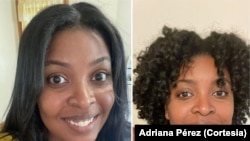“People give me compliments on the street for my hair. That was the big difference I’ve noticed since I started wearing it natural,” laughs Amaranta Sánchez, a Colombian “from the Caribbean, very black and with her hair on guard,” as she adjusts the big afro that frames her face.
For this civil engineer, wearing natural hair was “a whole process” that was not always pleasant. “I had to cut it very short to remove all the chemically treated part and be patient. In the end, for me, the keratin was torture and the smell was horrible. In the end I came out on top,” she adds.
Amaranta’s decision would have beneficial effects on her health. Recently, a new study published in the Journal of the National Cancer Institute in the US reported an increased chance of developing uterine cancer in women who regularly straighten their hair with products such as formaldehyde, common in popular Brazilian straightening treatments or keratin
The parabens and bisphenol A present in these products also interfere with hormonal processes. Other studies have already linked the use of relaxers with breast cancer.
Banishing the stigma of “bad hair”
For decades, blacks and mestizos in Latin America have grown up with the stigma of curls that must be controlled and straightened.
In the acclaimed film “Bad Hair”, the Venezuelan Mariana Rondón explores this complex search for identity through Junior, a boy who wants at all costs to tame his curls to look like his idol, a fashionable singer.
In that country, as in Colombia and Brazil, a large part of the beauty industry is dedicated to the production of hair straighteners, “a machinery that feeds on centuries of colonization,” says Amaranta, who nevertheless affirms that “many They are already realizing that there is no shame in being who you are and embracing your roots.”
In Cuba, several community initiatives that seek to change the narrative and “decolonize minds” have an audience that is growing by the day.
What began as an initiative to showcase the richness of Afro-Cuban culture became the Beyond Roots community project led by Adriana Heredia, a young economics professor turned entrepreneur. The project already has a physical store to sell “Afro” products such as dresses, t-shirts, bags, jewelry and soaps created specifically for black skin.
In its space in Old Havana, Beyond Roots also offers workshops and seminars where they share beauty tips and teach natural hair care techniques to a growing audience that is more eager for information.
That is where the line of natural curly hair products ¡Qué Negra! comes in, a venture by Cuban Erlys Pennycook that has become a community with members throughout the island.
“We have grown a lot in the last three years, only on Facebook we have gone from 5,000 to 61,000 followers and all this because we have stayed,” Pennycook explained to the voice of america in an interview via Whatsapp, the medium they use the most to sell their defining creams, moisturizing sprays and gels.
natural curls
Maintaining an artisanal production with supplies that range from plant extracts such as moringa, basil and rosemary to the expensive and difficult to find olive oil is extremely complicated in a country where something as basic as detergent becomes an odyssey.
“The pandemic has hit us hard. We don’t have the necessary logistics, but even so we have managed to continue”, indicates Pennycook, who is already anticipating new additions to the ¡Qué Negra! product line, which are not based on straightening, but on caring for and defining the curls.
Regarding formaldehyde and other chemicals, he warns that they are widely used “because it is a cheap ingredient, accessible to the cosmetic industry, without taking into account the long-term consequences” and that a change in mentality at a social level is something that takes time.
“I have done workshops and conferences, I have tried to educate from my small circle, so that people know that there are more options than lace up. But we can’t, even if we want to, suddenly change people’s mentality towards a much healthier standard of living,” he explains.
“What we can do is teach them what the correct path is and try to make them understand the message on their own conscience. As far as stigma and cultural lags are concerned, there is a need to do deeper work,” he says.
In this agrees Adriana Pérez, a Cuban who lives in Massachusetts, USA, and who has stopped straightening her hair in the last two years. “Change takes time. Black women need to educate themselves more about the components of what they put in their hair, ”she opines, as she states that empowerment does not come with the curls, but from within.
“It is true that wearing your hair natural takes more work, because you have to hydrate it and take good care of it, but nothing compares to four hours of straightening. I don’t feel more empowered than before, maybe I feel more comfortable, but nothing with me has changed. I am proud of my roots,” she insisted.
Connect with the Voice of America! Subscribe to our channel Youtube and turn on notifications, or follow us on social media: Facebook, Twitter and Instagram







![[Img #74664]](https://thelatestnews.world/wp-content/uploads/2024/12/James-Watson-The-controversial-genius-behind-the-double-helix-150x150.jpg)








